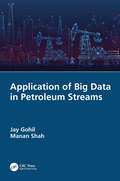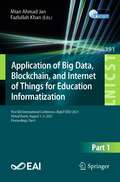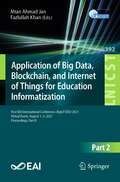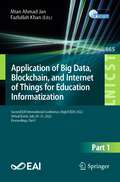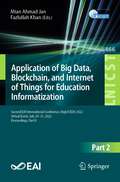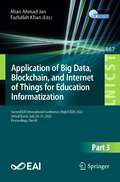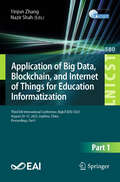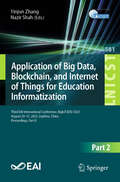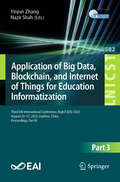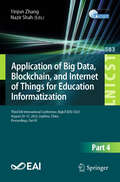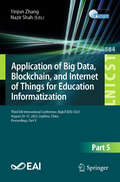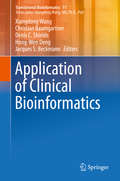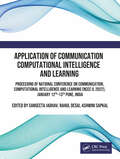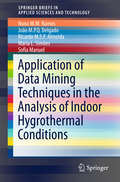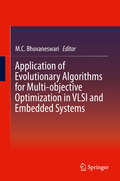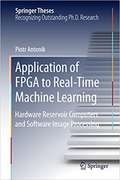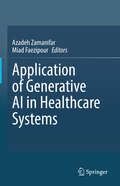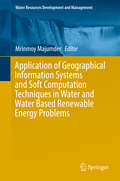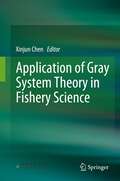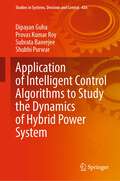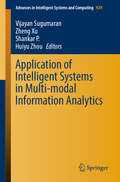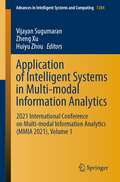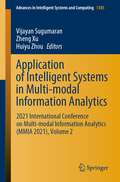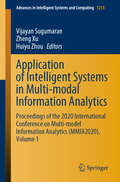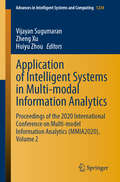- Table View
- List View
Application of Big Data in Petroleum Streams
by Jay Gohil Manan ShahThe book aims to provide comprehensive knowledge and information pertaining to application or implementation of big data in the petroleum industry and its operations (such as exploration, production, refining and finance). The book covers intricate aspects of big data such as 6Vs, benefits, applications, implementation, research work and real-world implementation pertaining to each petroleum-associated operation in a concise manner that aids the reader to apprehend the overview of big data’s role in the industry. The book resonates with readers who wish to understand the intricate details of working with big data (along with data science, machine learning and artificial intelligence) in general and how it affects and impacts an entire industry. As the book builds various concepts of big data from scratch to industry level, readers who wish to gain big data-associated knowledge of industry level in simple language from the very fundamentals would find this a wonderful read.
Application of Big Data, Blockchain, and Internet of Things for Education Informatization: First EAI International Conference, BigIoT-EDU 2021, Virtual Event, August 1–3, 2021, Proceedings, Part I (Lecture Notes of the Institute for Computer Sciences, Social Informatics and Telecommunications Engineering #391)
by Fazlullah Khan Mian Ahmad JanThis two-volume set constitutes the refereed proceedings of the First International Conference International Conference on Application of Big Data, Blockchain, and Internet of Things for Education Informatization. The conference was held in August 2021 and due to COVID-19 pandemic virtually.The 99 revised full papers and 45 short papers have been selected from 503 submissions. The papers describe research fields such as “big data” and “information education”. The aim of the conference is to provide international cooperation and exchange platforms for big data and information education experts, scholars and enterprise developers to share research results, discuss existing problems and challenges, and explore cutting-edge science and technology.
Application of Big Data, Blockchain, and Internet of Things for Education Informatization: First EAI International Conference, BigIoT-EDU 2021, Virtual Event, August 1–3, 2021, Proceedings, Part II (Lecture Notes of the Institute for Computer Sciences, Social Informatics and Telecommunications Engineering #392)
by Fazlullah Khan Mian Ahmad JanThis two-volume set constitutes the refereed proceedings of the First International Conference International Conference on Application of Big Data, Blockchain, and Internet of Things for Education Informatization. The conference was held in August 2021 and due to COVID-19 pandemic virtually. The 99 revised full papers and 45 short papers have been selected from 503 submissions. The papers describe research fields such as “big data” and “information education”. The aim of the conference is to provide international cooperation and exchange platforms for big data and information education experts, scholars and enterprise developers to share research results, discuss existing problems and challenges, and explore cutting-edge science and technology.
Application of Big Data, Blockchain, and Internet of Things for Education Informatization: Second EAI International Conference, BigIoT-EDU 2022, Virtual Event, July 29–31, 2022, Proceedings, Part I (Lecture Notes of the Institute for Computer Sciences, Social Informatics and Telecommunications Engineering #465)
by Fazlullah Khan Mian Ahmad JanThe three-volume set LNICST 465, 466 and 467 constitutes the proceedings of the Second EAI International Conference on Application of Big Data, Blockchain, and Internet of Things for Education Informatization, BigIoT-EDU 2022, held as virtual event, in July 29–31, 2022. The 204 papers presented in the proceedings were carefully reviewed and selected from 550 submissions. BigIoT-EDU aims to provide international cooperation and exchange platform for big data and information education experts, scholars and enterprise developers to share research results, discuss existing problems and challenges, and explore cutting-edge science and technology. The conference focuses on research fields such as “Big Data” and “Information Education. The use of Artificial Intelligence (AI), Blockchain and network security lies at the heart of this conference as we focused on these emerging technologies to excel the progress of Big Data and information education.
Application of Big Data, Blockchain, and Internet of Things for Education Informatization: Second EAI International Conference, BigIoT-EDU 2022, Virtual Event, July 29–31, 2022, Proceedings, Part II (Lecture Notes of the Institute for Computer Sciences, Social Informatics and Telecommunications Engineering #466)
by Fazlullah Khan Mian Ahmad JanThe three-volume set LNICST 465, 466 and 467 constitutes the proceedings of the Second EAI International Conference on Application of Big Data, Blockchain, and Internet of Things for Education Informatization, BigIoT-EDU 2022, held as virtual event, in July 29–31, 2022. The 204 papers presented in the proceedings were carefully reviewed and selected from 550 submissions. BigIoT-EDU aims to provide international cooperation and exchange platform for big data and information education experts, scholars and enterprise developers to share research results, discuss existing problems and challenges, and explore cutting-edge science and technology. The conference focuses on research fields such as “Big Data” and “Information Education. The use of Artificial Intelligence (AI), Blockchain and network security lies at the heart of this conference as we focused on these emerging technologies to excel the progress of Big Data and information education.
Application of Big Data, Blockchain, and Internet of Things for Education Informatization: Second EAI International Conference, BigIoT-EDU 2022, Virtual Event, July 29–31, 2022, Proceedings, Part III (Lecture Notes of the Institute for Computer Sciences, Social Informatics and Telecommunications Engineering #467)
by Fazlullah Khan Mian Ahmad JanThe three-volume set LNICST 465, 466 and 467 constitutes the proceedings of the Second EAI International Conference on Application of Big Data, Blockchain, and Internet of Things for Education Informatization, BigIoT-EDU 2022, held as virtual event, in July 29–31, 2022. The 204 papers presented in the proceedings were carefully reviewed and selected from 550 submissions. BigIoT-EDU aims to provide international cooperation and exchange platform for big data and information education experts, scholars and enterprise developers to share research results, discuss existing problems and challenges, and explore cutting-edge science and technology. The conference focuses on research fields such as “Big Data” and “Information Education. The use of Artificial Intelligence (AI), Blockchain and network security lies at the heart of this conference as we focused on these emerging technologies to excel the progress of Big Data and information education.
Application of Big Data, Blockchain, and Internet of Things for Education Informatization: Third EAI International Conference, BigIoT-EDU 2023, August 29-31, 2023, Liuzhou, China, Proceedings, Part I (Lecture Notes of the Institute for Computer Sciences, Social Informatics and Telecommunications Engineering #580)
by Yinjun Zhang Nazir ShahThe five-volume set LNICST 580-584 constitutes the proceedings of the Third EAI International Conference on Application of Big Data, Blockchain, and Internet of Things for Education Informatization, BigIoT-EDU 2023, held in Liuzhou, China, during August 29–31, 2023. The 272 full papers presented in these proceedings were carefully reviewed and selected from 718 submissions. With a primary focus on research fields such as Digitization of education, Smart classrooms and Massive Online Open Courses (MOOCs), these papers are organized in the following topical sections across the five volumes: Part I: Application of data mining in smart education; Application of intelligent algorithms in English teaching. Part II: Application of decision tree algorithm in intelligent management system of universities; Research on the application of Big data in smart teaching. Part III: Exploration of the application of computer-aided technology in intelligent translation; Application of neural network algorithms in intelligent teaching; Application of artificial intelligence algorithms in the field of smart education. Part IV: Research on smart teaching in deep learning; Research and application of recommendation algorithms in personalized intelligent education; Application of cloud computing in intelligent teaching resource library; Application research of computer-aided online intelligent teaching. Part V: Application and practice of new media in smart teaching; Application of clustering algorithm in intelligent education resource library; Application of association rule algorithm in intelligent education system.
Application of Big Data, Blockchain, and Internet of Things for Education Informatization: Third EAI International Conference, BigIoT-EDU 2023, August 29-31, 2023, Liuzhou, China, Proceedings, Part II (Lecture Notes of the Institute for Computer Sciences, Social Informatics and Telecommunications Engineering #581)
by Yinjun Zhang Nazir ShahThe five-volume set LNICST 580-584 constitutes the proceedings of the Third EAI International Conference on Application of Big Data, Blockchain, and Internet of Things for Education Informatization, BigIoT-EDU 2023, held in Liuzhou, China, during August 29–31, 2023. The 272 full papers presented in these proceedings were carefully reviewed and selected from 718 submissions. With a primary focus on research fields such as Digitization of education, Smart classrooms and Massive Online Open Courses (MOOCs), these papers are organized in the following topical sections across the five volumes: Part I: Application of data mining in smart education; Application of intelligent algorithms in English teaching. Part II: Application of decision tree algorithm in intelligent management system of universities; Research on the application of Big data in smart teaching. Part III: Exploration of the application of computer-aided technology in intelligent translation; Application of neural network algorithms in intelligent teaching; Application of artificial intelligence algorithms in the field of smart education. Part IV: Research on smart teaching in deep learning; Research and application of recommendation algorithms in personalized intelligent education; Application of cloud computing in intelligent teaching resource library; Application research of computer-aided online intelligent teaching. Part V: Application and practice of new media in smart teaching; Application of clustering algorithm in intelligent education resource library; Application of association rule algorithm in intelligent education system.
Application of Big Data, Blockchain, and Internet of Things for Education Informatization: Third EAI International Conference, BigIoT-EDU 2023, August 29-31, 2023, Liuzhou, China, Proceedings, Part III (Lecture Notes of the Institute for Computer Sciences, Social Informatics and Telecommunications Engineering #582)
by Yinjun Zhang Nazir ShahThe five-volume set LNICST 580-584 constitutes the proceedings of the Third EAI International Conference on Application of Big Data, Blockchain, and Internet of Things for Education Informatization, BigIoT-EDU 2023, held in Liuzhou, China, during August 29–31, 2023. The 272 full papers presented in these proceedings were carefully reviewed and selected from 718 submissions. With a primary focus on research fields such as Digitization of education, Smart classrooms and Massive Online Open Courses (MOOCs), these papers are organized in the following topical sections across the five volumes: Part I: Application of data mining in smart education; Application of intelligent algorithms in English teaching. Part II: Application of decision tree algorithm in intelligent management system of universities; Research on the application of Big data in smart teaching. Part III: Exploration of the application of computer-aided technology in intelligent translation; Application of neural network algorithms in intelligent teaching; Application of artificial intelligence algorithms in the field of smart education. Part IV: Research on smart teaching in deep learning; Research and application of recommendation algorithms in personalized intelligent education; Application of cloud computing in intelligent teaching resource library; Application research of computer-aided online intelligent teaching. Part V: Application and practice of new media in smart teaching; Application of clustering algorithm in intelligent education resource library; Application of association rule algorithm in intelligent education system.
Application of Big Data, Blockchain, and Internet of Things for Education Informatization: Third EAI International Conference, BigIoT-EDU 2023, August 29-31, 2023, Liuzhou, China, Proceedings, Part IV (Lecture Notes of the Institute for Computer Sciences, Social Informatics and Telecommunications Engineering #583)
by Yinjun Zhang Nazir ShahThe five-volume set LNICST 580-584 constitutes the proceedings of the Third EAI International Conference on Application of Big Data, Blockchain, and Internet of Things for Education Informatization, BigIoT-EDU 2023, held in Liuzhou, China, during August 29–31, 2023. The 272 full papers presented in these proceedings were carefully reviewed and selected from 718 submissions. With a primary focus on research fields such as Digitization of education, Smart classrooms and Massive Online Open Courses (MOOCs), these papers are organized in the following topical sections across the five volumes: Part I: Application of data mining in smart education; Application of intelligent algorithms in English teaching. Part II: Application of decision tree algorithm in intelligent management system of universities; Research on the application of Big data in smart teaching. Part III: Exploration of the application of computer-aided technology in intelligent translation; Application of neural network algorithms in intelligent teaching; Application of artificial intelligence algorithms in the field of smart education. Part IV: Research on smart teaching in deep learning; Research and application of recommendation algorithms in personalized intelligent education; Application of cloud computing in intelligent teaching resource library; Application research of computer-aided online intelligent teaching. Part V: Application and practice of new media in smart teaching; Application of clustering algorithm in intelligent education resource library; Application of association rule algorithm in intelligent education system.
Application of Big Data, Blockchain, and Internet of Things for Education Informatization: Third EAI International Conference, BigIoT-EDU 2023, August 29-31, 2023, Liuzhou, China, Proceedings, Part V (Lecture Notes of the Institute for Computer Sciences, Social Informatics and Telecommunications Engineering #584)
by Yinjun Zhang Nazir ShahThe five-volume set LNICST 580-584 constitutes the proceedings of the Third EAI International Conference on Application of Big Data, Blockchain, and Internet of Things for Education Informatization, BigIoT-EDU 2023, held in Liuzhou, China, during August 29–31, 2023. The 272 full papers presented in these proceedings were carefully reviewed and selected from 718 submissions. With a primary focus on research fields such as Digitization of education, Smart classrooms and Massive Online Open Courses (MOOCs), these papers are organized in the following topical sections across the five volumes: Part I: Application of data mining in smart education; Application of intelligent algorithms in English teaching. Part II: Application of decision tree algorithm in intelligent management system of universities; Research on the application of Big data in smart teaching. Part III: Exploration of the application of computer-aided technology in intelligent translation; Application of neural network algorithms in intelligent teaching; Application of artificial intelligence algorithms in the field of smart education. Part IV: Research on smart teaching in deep learning; Research and application of recommendation algorithms in personalized intelligent education; Application of cloud computing in intelligent teaching resource library; Application research of computer-aided online intelligent teaching. Part V: Application and practice of new media in smart teaching; Application of clustering algorithm in intelligent education resource library; Application of association rule algorithm in intelligent education system.
Application of Clinical Bioinformatics (Translational Bioinformatics #11)
by Xiangdong Wang Christian Baumgartner Denis C. Shields Hong-Wen Deng Jacques S. BeckmannThis bookelucidates how genetic, biological and medical information can be applied tothe development of personalized healthcare, medication and therapies. Focusingon aspects of the development of evidence-based approaches in bioinformaticsand computational medicine, including data integration, methodologies, toolsand models for clinical and translational medicine, it offers an essentialintroduction to clinical bioinformatics for clinical researchers andphysicians, medical students and teachers, and scientists working with human disease-based omics and bioinformatics. Dr. XiangdongWang is a distinguished Professor of Medicine. He is Director of ShanghaiInstitute of Clinical Bioinformatics, Director of Fudan University Center forClinical Bioinformatics, Deputy Director of Shanghai Respiratory ResearchInstitute, Director of Biomedical Research Center, Fudan University ZhongshanHospital, Shanghai, China; Dr. Christian Baumgartner is a Professor of HealthCare and Biomedical Engineering at Institute of Health Care Engineering withEuropean Notified Body of Medical Devices, Graz University of Technology, Graz,Austria; Dr. Denis Shields is a Professor of ClinicalBioinformatics at Conway Institute, Belfield, Dublin, Ireland; Dr. Hong-Wen Dengis a Professor at Department of Biostatistics and Bioinformatics, Tulane UniversitySchool of Public Health and Tropical Medicine, USA; Dr. Jacques SBeckmann is a Professor and Director of Section of Clinical Bioinformatics,Swiss Institute of Bioinformatics, Switzerland.
Application of Communication Computational Intelligence and Learning: Proceeding of National Conference on Communication, Computational Intelligence and Learning (NCCC IL 2021), December 16th–17th Pune, India
by Sangeeta Jadhav; Rahul Desai; Ashwini SapkalThe special issue is dedicated to National conference on Communication, computational intelligence and learning-NCCCIL sponsored by AICTE and organized by Department of Information Technology at Army Institute of Technology from 12–13 January 2022. This conference gave the collaborative forum to academic experts, researchers and corporate professionals to enrich their knowledge in the automation and analysis of industry and business processes in a smart way. The two day conference included invited talks and paper presentations focusing on the applications of Computational intelligence, Communication, Machine Learning and Artificial Intelligence.
Application of Data Mining Techniques in the Analysis of Indoor Hygrothermal Conditions (SpringerBriefs in Applied Sciences and Technology)
by Nuno M. M. Ramos João M. P. Q. Delgado Ricardo M. S. F. Almeida Maria L. Simões Sofia ManuelThe main benefit of the book is that it explores available methodologies for both conducting in-situ measurements and adequately exploring the results, based on a case study that illustrates the benefits and difficulties of concurrent methodologies. The case study corresponds to a set of 25 social housing dwellings where an extensive in situ measurement campaign was conducted. The dwellings are located in the same quarter of a city. Measurements included indoor temperature and relative humidity, with continuous log in different rooms of each dwelling, blower-door tests and complete outdoor conditions provided by a nearby weather station. The book includes a variety of scientific and engineering disciplines, such as building physics, probability and statistics and civil engineering. It presents a synthesis of the current state of knowledge for benefit of professional engineers and scientists.
Application of Evolutionary Algorithms for Multi-objective Optimization in VLSI and Embedded Systems
by M. C. BhuvaneswariThis book describes how evolutionary algorithms (EA), including genetic algorithms (GA) and particle swarm optimization (PSO) can be utilized for solving multi-objective optimization problems in the area of embedded and VLSI system design. Many complex engineering optimization problems can be modelled as multi-objective formulations. This book provides an introduction to multi-objective optimization using meta-heuristic algorithms, GA and PSO and how they can be applied to problems like hardware/software partitioning in embedded systems, circuit partitioning in VLSI, design of operational amplifiers in analog VLSI, design space exploration in high-level synthesis, delay fault testing in VLSI testing and scheduling in heterogeneous distributed systems. It is shown how, in each case, the various aspects of the EA, namely its representation and operators like crossover, mutation, etc, can be separately formulated to solve these problems. This book is intended for design engineers and researchers in the field of VLSI and embedded system design. The book introduces the multi-objective GA and PSO in a simple and easily understandable way that will appeal to introductory readers.
Application of FPGA to Real‐Time Machine Learning: Hardware Reservoir Computers And Software Image Processing (Springer Theses)
by Piotr AntonikNominated as an outstanding Ph.D. thesis by the Université libre de Bruxelles, Belgium.<p><p> Provides a thorough introduction to reservoir computing and field-programmable gate arrays Discusses the problems encountered on the path to the results discussed Uses an engaging and lively writing style.<p> This book lies at the interface of machine learning – a subfield of computer science that develops algorithms for challenging tasks such as shape or image recognition, where traditional algorithms fail – and photonics – the physical science of light, which underlies many of the optical communications technologies used in our information society. It provides a thorough introduction to reservoir computing and field-programmable gate arrays (FPGAs).<p> Recently, photonic implementations of reservoir computing (a machine learning algorithm based on artificial neural networks) have made a breakthrough in optical computing possible. In this book, the author pushes the performance of these systems significantly beyond what was achieved before. By interfacing a photonic reservoir computer with a high-speed electronic device (an FPGA), the author successfully interacts with the reservoir computer in real time, allowing him to considerably expand its capabilities and range of possible applications. Furthermore, the author draws on his expertise in machine learning and FPGA programming to make progress on a very different problem, namely the real-time image analysis of optical coherence tomography for atherosclerotic arteries.
Application of Generative AI in Healthcare Systems
by Azadeh Zamanifar Miad FaezipourGenerative AI has immensely influenced various fields, such as education, marketing, art and music, and especially healthcare. Generative AI can benefit the patient through various approaches. For instance, it can enhance the image qualities negatively affected by radiation reduction, preventing patients from needing to repeat the image-taking process. Also, the generation of one type of image from another more expensive one can help patients save funds. Generative AI facilitates the administrative process, letting the doctor focus more on the treatment process. It even goes further by helping medical professionals with diagnosis and decision- making, suggesting possible treatment plans according to the patient symptoms. This book introduces several practical GenAI healthcare applications, especially in medical imaging, pandemic prediction, synthetic data generation, clinical administration support, professional education, patient engagement, and clinical decision support, providing a review of efficient GenAI tools and frameworks in this area. GenAI empowers the treatment process through several methods; however, some ethical, privacy, and security challenges require attention. Despite the challenges presented, GenAI technological and inherited characteristics smooth the path of improvement for it in the future.
Application of Geographical Information Systems and Soft Computation Techniques in Water and Water Based Renewable Energy Problems (Water Resources Development and Management)
by Mrinmoy MajumderThis book highlights the application of Geographical Information System (GIS) and nature based algorithms to solve the problems of water and water based renewable energy resources. The irregularity in availability of resources and inefficiency in utilization of the available resources has reduced the potentiality of water and water based renewable energy resources. In recent years various soft computation methods (SCM) along with GIS were adopted to solve critical problems. The book collects various studies where many SCMs were used along with GIS to provide a solution for optimal utilization of natural resources for satisfying the basic needs of the population as well as fulfilling their burgeoning energy demands. The articles depict innovative application of soft computation techniques to identify the root cause and to mitigate the uncertainty for optimal utilization of the available water resources. The advantage of SCM and GIS were used to maximize the utilization of water resources under cost and time constraints in face of climatic abnormalities and effect of rapid urbanization.
Application of Gray System Theory in Fishery Science
by Xinjun ChenThis book reviews the gray system and combines its latest research results in fishery science. The chapters cover the basic concept and theory of gray system, original data processing and gray sequence generation, gray correlation analysis, gray cluster analysis, gray system modeling, gray prediction, gray decision-making, and gray linear programming. The theory of gray system is a new cross-sectional discipline founded in 1982 by Professor Deng Julong, a well-known scholar in China. In recent decades, it has not only been deepened and expanded in theory but also widely used in the fields of society, economy, ocean, agriculture, fishery, and other fields, and made a series of significant scientific achievements. These have laid the foundation for the important position of the gray system theory. Due to the great uncertainty of the fishery resources and the fishery environment involved in the fishery science system, which is completely different from the natural resources on the land, the data and information belong to the category of “poor information”, and the variability and uncertainty are greater than other natural resources. As an extremely effective analytical method and tool, gray system theory has been applied increasingly in fishery science. The book is developed based on well-read and practical literature and will help scientists and research units engaged in scientific research and teaching in fishery science and related fields to develop new research methods and tools.
Application of Intelligent Control Algorithms to Study the Dynamics of Hybrid Power System (Studies in Systems, Decision and Control #426)
by Dipayan Guha Provas Kumar Roy Subrata Banerjee Shubhi PurwarThis book aims to systematically review and design different intelligent control algorithms for the small-signal stability assessment of HPS. With the growing consciousness of global warming and the fast depletion of natural power generation resources, the existing power system is on the verge of transitions to a “hybrid power system (HPS)” integrated with distributed energy resources. The recent results and requirements for the developments of intelligent control algorithms have motivated the authors to introduce this book for extensively analyzing the performance of HPS against unknown/uncertain disturbances. This book introduces fractional-order resilient control methodologies for arresting small-signal instability of HPS. The prospective investigation has been performed on the MATLAB platform. This book is helpful for undergraduate, postgraduate students, and research scholars working in power system stability, control applications, and soft computing in particular.
Application of Intelligent Systems in Multi-modal Information Analytics (Advances in Intelligent Systems and Computing #929)
by Vijayan Sugumaran Zheng Xu Shankar P. Huiyu ZhouThis book presents the proceedings of the 2019 International Conference on Intelligent Systems Applications in Multi-modal Information Analytics, held in Shenyang, China on February 19-20, 2019. It provides comprehensive coverage of the latest advances and trends in information technology, science and engineering, addressing a number of broad themes, including data mining, multi-modal informatics, agent-based and multi-agent systems for health and education informatics, which inspire the development of intelligent information technologies. The contributions cover a wide range of topics: AI applications and innovations in health and education informatics; data and knowledge management; multi-modal application management; and web/social media mining for multi-modal informatics. Outlining promising future research directions, the book is a valuable resource for students, researchers and professionals, and provides a useful reference guide for newcomers to the field.
Application of Intelligent Systems in Multi-modal Information Analytics: 2021 International Conference on Multi-modal Information Analytics (MMIA 2021), Volume 1 (Advances in Intelligent Systems and Computing #1384)
by Vijayan Sugumaran Zheng Xu Huiyu ZhouThis book provides comprehensive coverage of the latest advances and trends in information technology, science and engineering. Specifically, it addresses a number of broad themes, including multi-modal informatics, data mining, agent-based and multi-agent systems for health and education informatics, which inspire the development of intelligent information technologies. The contributions cover a wide range of topics such as AI applications and innovations in health and education informatics; data and knowledge management; multi-modal application management; and web/social media mining for multi-modal informatics. Outlining promising future research directions, the book is a valuable resource for students, researchers and professionals, and a useful reference guide for newcomers to the field. This book is a compilation of the papers presented in the 2021 International Conference on Multi-modal Information Analytics, held in Huhehaote, China, on April 23–24, 2021.
Application of Intelligent Systems in Multi-modal Information Analytics: 2021 International Conference on Multi-modal Information Analytics (MMIA 2021), Volume 2 (Advances in Intelligent Systems and Computing #1385)
by Vijayan Sugumaran Zheng Xu Huiyu ZhouThis book provides comprehensive coverage of the latest advances and trends in information technology, science and engineering. Specifically, it addresses a number of broad themes, including multi-modal informatics, data mining, agent-based and multi-agent systems for health and education informatics, which inspire the development of intelligent information technologies. The contributions cover a wide range of topics such as AI applications and innovations in health and education informatics; data and knowledge management; multi-modal application management; and web/social media mining for multi-modal informatics. Outlining promising future research directions, the book is a valuable resource for students, researchers and professionals, and a useful reference guide for newcomers to the field. This book is a compilation of the papers presented in the 2021 International Conference on Multi-modal Information Analytics, held in Huhehaote, China, on April 23–24, 2021.
Application of Intelligent Systems in Multi-modal Information Analytics: Proceedings of the 2020 International Conference on Multi-model Information Analytics (MMIA2020), Volume 1 (Advances in Intelligent Systems and Computing #1233)
by Vijayan Sugumaran Zheng Xu Huiyu ZhouThis book presents the proceedings of the 2020 International Conference on Intelligent Systems Applications in Multi-modal Information Analytics, held in Changzhou, China, on June 18–19, 2020. It provides comprehensive coverage of the latest advances and trends in information technology, science and engineering. It addresses a number of broad themes, including data mining, multi-modal informatics, agent-based and multi-agent systems for health and education informatics, which inspire the development of intelligent information technologies. The contributions cover a wide range of topics such as AI applications and innovations in health and education informatics; data and knowledge management; multi-modal application management; and web/social media mining for multi-modal informatics. Outlining promising future research directions, the book is a valuable resource for students, researchers and professionals, and a useful reference guide for newcomers to the field.
Application of Intelligent Systems in Multi-modal Information Analytics: Proceedings of the 2020 International Conference on Multi-model Information Analytics (MMIA2020), Volume 2 (Advances in Intelligent Systems and Computing #1234)
by Vijayan Sugumaran Zheng Xu Huiyu ZhouThis book presents the proceedings of the 2020 International Conference on Intelligent Systems Applications in Multi-modal Information Analytics, held in Changzhou, China, on June 18–19, 2020. It provides comprehensive coverage of the latest advances and trends in information technology, science and engineering. It addresses a number of broad themes, including data mining, multi-modal informatics, agent-based and multi-agent systems for health and education informatics, which inspire the development of intelligent information technologies. The contributions cover a wide range of topics such as AI applications and innovations in health and education informatics; data and knowledge management; multi-modal application management; and web/social media mining for multi-modal informatics. Outlining promising future research directions, the book is a valuable resource for students, researchers and professionals, and a useful reference guide for newcomers to the field.
